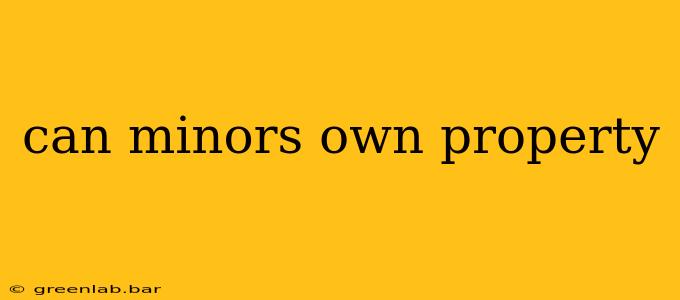The question of whether minors can own property is complex, varying significantly based on jurisdiction and the type of property involved. While the answer isn't a simple yes or no, understanding the legal frameworks surrounding minors and property ownership is crucial for parents, guardians, and the minors themselves. This guide will explore the intricacies of this topic, offering clarity and practical insights.
Understanding the Legal Framework: Minors and Property Ownership
In most jurisdictions, minors – individuals who haven't reached the legal age of majority (typically 18, but sometimes 21) – can own property. However, this ownership is often subject to significant limitations and legal safeguards designed to protect the minor's interests. The complexities arise from the legal principle that minors lack the full legal capacity to enter into contracts or manage their affairs independently.
Types of Property Ownership
The type of property significantly impacts how ownership is handled for minors:
-
Real Property (Land and Buildings): Minors can inherit real estate, receive it as a gift, or even purchase it (though this requires adult involvement). However, managing the property requires a legal guardian or conservator to act on the minor's behalf, handling transactions like leasing, selling, or mortgaging.
-
Personal Property (Moveable Assets): Minors can own personal property such as savings accounts, stocks, bonds, or other assets. Similar to real property, managing these assets usually necessitates the involvement of a legal guardian or conservator who acts in the minor's best interests until they reach legal adulthood.
The Role of Guardians and Conservators
The central figure in managing a minor's property is the legal guardian or conservator. These individuals are appointed by the court and are legally responsible for managing the minor's assets responsibly and prudently. Their actions must always be in the minor's best interests, ensuring the property is preserved and used wisely. This involves meticulous record-keeping and financial reporting to the court.
Practical Implications and Considerations
Several key practical considerations arise when dealing with property owned by minors:
-
Estate Planning: Including property ownership in a will or trust for a minor is common. This ensures the property is managed appropriately after the death of a parent or guardian. Careful planning is essential to clearly define the guardianship and management of the assets.
-
Taxes: Minors are still liable for taxes on any income generated from their property, even if they are unable to manage the assets independently. Guardians or conservators are responsible for filing the necessary tax returns on behalf of the minor.
-
Legal Representation: Navigating the complexities of minor property ownership often requires the assistance of legal professionals, such as attorneys specializing in estate planning or probate law. They can guide parents, guardians, and the minor through the legal processes and ensure compliance with all regulations.
-
Court Involvement: Court approval may be required for significant transactions involving a minor's property, such as selling a house or making substantial investments. The court oversees these decisions to ensure the minor's interests are adequately protected.
Conclusion: Navigating the Nuances of Minor Property Ownership
While minors can indeed own property, it's a process fraught with legal and practical considerations. Understanding the role of guardians, conservators, and the legal framework governing such situations is crucial for ensuring responsible management and protecting the minor's best interests. Seeking professional legal advice is highly recommended to navigate this complex area successfully. Failure to do so could lead to significant legal complications and financial risks for the minor.

